Don't wanna be here? Send us removal request.
Text
Week 10: Expected Demands
After we released the first version of our CampusGuide AI app, we talked to seven students to hear what they thought about the application itself. This early version of the app has three main parts: a way to log in, a map of the campus, and a chatbot that answers simple questions.
Andrew (3rd year TCM student) had both good and bad things to say about the app. He liked that the chatbot answered his questions pertaining the handbook. But he didn't think the map was easy enough to use. "It would be better if the map had a 3D view function, it's a bit too much but if only we could interact with it somehow" he told us.
Jake (2nd year BS Arch student) thought the map was helpful. But he wanted us to add a search box so he could quickly find specific buildings without having to look all over the map.
Johann (3rd year TCM student) wondered why he had to download the app at all. He asked why we didn't make a version that works in a web browser. Johann felt that having to download something just to ask a quick question was too much trouble "I particularly don't like having to download things".
Kevin (2nd year BSIT student) said the map helped him find buildings, but he couldn't tell where the doors were. He thought it would be good if the map showed the entrances to buildings and the paths to get there.
Kyle (1st year BSCS student) found the chatbot worked well, but sometimes it gave answers that were too general. Kyle wants the chatbot to give more exact answers, especially when asked about when classes start and end.
Carl (3rd year BSTCM student) liked being able to use the app whenever he wanted. But he wishes it had a dark mode that's easier on the eyes. "It's straining to use at night, I like the general purpose but I value my aesthetic preferences a lot" he said with a laugh.
Rafael (4th year BSIT student) liked having a map in the app but thought it looks too generic. He suggested we make the map work a little more interactive with ways to introduce students where to go, especially for students who have older phones.
From all these talks, we learned that students see good things in our app but also many ways we could make it better. To make it more accommodating, fine tuning the data and expanding its resources is truly one thing to consider.

0 notes
Text
Week 11: Reflecting on expectations
As we have completed our minimum viable product and decided to let certain amounts of student test the application the hotbed, of potential users found within the campus itself. Furthermore we asked seven students at USTP-CDO to try our new CampusGuide AI app. We wanted to see how they liked the login screen, the campus map, and the chatbot helper.
Marvin, who is in his second year studying IT, thought the app was a good idea. But he had trouble using the map. "It would be nice if building names were clearer on the map," he told us. Marvin also said that once you get to a building, it would help to have a way to find rooms inside. He thinks big buildings need their own maps to show where rooms are.
Nichole is in her third year studying TCM. She was upset that she couldn't get the app on her iPhone. "Why isn't it on the iOS store yet?" she asked us. Nichole pointed out that lots of students use iPhones. She thinks we should make sure the app works on all kinds of phones so more students can use it. "The app serves a good purpose to students like us, but if IOS ports are not yet available unfortunately it won't be of much use to a generic public" she told us.
Clara, a first-year Mechanical Engineering student, used the chatbot but didn't like some of the answers. She said they were not clear enough, especially when she tried to find out when offices are open. Clara wants the chatbot to give more complete answers that really help students find what they need.
Paul is in his fourth year of Civil Engineering. He generally liked the app but was worried about his personal information. "Is my data secure?" he asked. Paul thinks we need to clearly explain how we keep student information safe. He wants to know what happens to his data when he uses the app.
Jym, a third-year TCM student, said the chatbot needs to sound more like a real person. He found that it gave correct answers to his questions, but talking to it felt like talking to a machine. "If it could sound more natural, like chatting with a friend, that would make it better," Jym told us. He thinks a friendlier chatbot would be more fun to use. "If the purpose were to be more welcoming towards fresh students, then this is a must" he told us as he associates the situation to week of welcome.
Christian is studying Mechanical Engineering in his third year. He found the chatbot helpful for basic questions, but when he asked about lab schedules, it couldn't give him the right information. Christian thinks we should add more answers about specific things like when labs are open and what equipment they have. He wants the chatbot to know more details about campus activities.
Sam, a fourth-year Electrical Engineering student, liked using the app to find his way around campus. But he thought the app was hard to use at times. "Some buttons are too small to tap easily," he said. Sam thinks we should make the buttons bigger and make the whole app easier to use, especially when walking around campus. "a minimalistic approach is good and all but at least let the buttons be accessible" he told us.
From talking to these students, we learned that they like the idea of our CampusGuide AI app. But they want us to make it easier to use. They want the map to be clearer. They want the chatbot to give better answers and sound more friendly. They want the app to work on all phones. And they want to make sure their information is safe. If we make these changes, students will like the app much more.
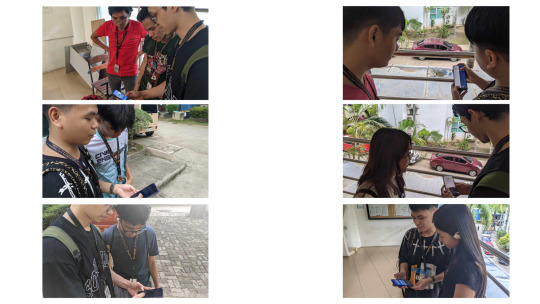
0 notes
Text
Week 9: Student Voices on Navigation Solutions
During the progression of the interview, we now have tackled about the solutions that the students want to be addressed while thinking of certain problems that commonly arise when looking for answers. Especially when tackling about courses being added or dropped. The experience of student life is crucial for finding a specific refinement of the a certain problem that the product would need to address. That said these are the following responses that the students have provided.
Gerome fourth year IT students says that "Finding out about important stuff is really hard here. Most times we get updates when it's already too late, or you hear it from friends after you've missed a deadline. When you're already busy with classes and requirements, not knowing what's going on just makes everything harder."
Ray a data science student stated that "Every office does things their own way. There's no one place to find answers. You have to keep asking different people or just guess how things work. I wish there was one simple guide that showed me exactly what to do for each process - it would save me so much time!"
Jan a third year IT student tells us that he hates waiting for days just for email replies. Sometimes he need a quick answer about dropping a class or submitting a form, but nobody gets back to me. A system that could answer basic questions right away would help students a lot and probably make life easier for the staff too.
Emanuel a third year civil engineering students stated that "Finding new buildings was so confusing when I started here. I spent my first weeks just wandering around, asking random people for directions. An app with a map that I could check on my phone anytime would've been great. Even now, when I need to go to an office I've never been to before, not to mention this only not affects faculty offices but student organization offices too, I still get lost sometimes."
Gelo a third year IT student tells us that "We all just use group chats to share school information, but you can't always trust what you read there. Someone will say 'I think registration starts next week' and then you find out it was actually yesterday. We need something official that we can check anytime to get the real information."
Jiesle a fourth year business administration students states that "The worst is when you don't even know what you're supposed to be doing until it's almost too late. Like getting signatures for graduation or checking if you've paid all your fees. I wish there was something that could remind me about these things ahead of time and tell me exactly what steps to take."
Karl A third year civil engineering student states that "Whatever you make needs to be super easy to use. If students have to spend more than a minute figuring out how it works, they'll just give up and go back to asking friends. It needs to be quick and simple, or nobody will use it."

0 notes
Text
Week 8: Asking for convenience
As we proceed with the following interviews, the interviewees had more emphasis on what the school would be offering in terms of information for the students. As we proceeded with four 3rd year students from the Department of College Engineering and Architecture. and A couple of second year students who remembers their freshmen days within the campus.
Dence Celiz says university offices rarely update their information online. She often has to visit in person just to ask simple questions like if they're still hiring student assistants, only to be told to "wait for a call" with no clear timeline. "It's so tiring," she says, especially when these updates could easily be posted somewhere everyone can see them. One office that usually takes too long to provide answers would be the faculty office of the CEA building she stated.
Jonray Anoos finds even logging into school websites frustrating. He usually searches Facebook groups hoping someone has already asked his question. "Most of the information you find is outdated anyway," he adds. While he sees the value in having better tools, he admits, "Honestly, I'm tired of having to learn new systems just to get basic information. Do I really want to watch a 17 minute video of having to understand a portal, As an athlete I just want something simple no complicated steps, no extra downloads."
Chriscel Datan struggles most with finding specific rules for her department. "The school websites don't have everything you need, and they take forever to update when things change, like new payment methods, although we usually just stick to Gcash for this" she explains. She ends up asking through multiple channels email, student groups, and even visiting offices in person just to get accurate information.
Mara Saquilayan gets frustrated with last-minute announcements and sudden deadline changes. "I check the school website, ask in student groups, or call the office directly, but there are always delays or wrong information, " she says. "It makes everything so stressful. That payment lady near the gym lobby would often have to let me go through the LRC building back and forth only to find out the office is empty during particular days." She likes the idea of having instant help but hopes for something straightforward "Just give me something quick and simple. I don't want to do extra work just to get information."
Adrian remembers his freshman year as extremely confusing. "Everything was new I didn't know where offices were, how to handle paperwork, or which events were important," he recalls. He thinks having instant guidance would have helped a lot, "but only if it's actually easy to use and doesn't make things more complicated."
Yuri found it difficult to adjust to college life, especially when he didn't know anyone or understand how things worked. "I'm pretty shy about asking questions," he admits. he thinks having quick answers available would be helpful for students like him who hesitates to approach the staff or other students. "But I don't want it to become just another confusing system that we're forced to use but don't actually like. Take it for example the HIMS portal, its already difficult to access the system and get a medical certificate."
James remembers how tough his first year was trying to understand class schedules, campus rules, and locating different offices. "I spent so much time just figuring out the basics," he admits. He thinks having quick access to accurate information would be really helpful for new students" but only if it actually works properly and the information is correct. Otherwise it's just one more thing to deal with.
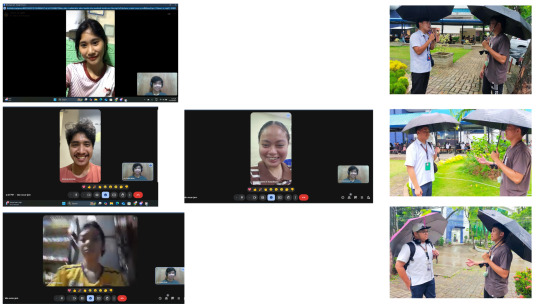
0 notes
Text
Week 7: Insights from Real Stories
The student experience is an evolving puzzle of challenges and creative solutions. While some obstacles like enrollment confusion are shared campus wide, others require personal coping strategies. This week, we explored not just the problems students face, but the ingenious ways they navigate imperfect systems.
Vincent has become an expert in last-minute information gathering. Between shifting class schedules and unclear requirements, he's developed a system of rapid-fire messages to classmates and frantic social media checks. "I've lost count of how many times I've acted on wrong information," he admitted. His experience reveals a troubling reality: students have become adept at managing chaos because reliable systems don't exist.
John crafted his own academic support network when official channels failed him. "Professor office hours never matched my schedule, so we created our own study collective," he explained. While proud of their resourcefulness, he imagines how much further they could go with an AI assistant that could instantly clarify concepts, recommend resources, and even optimize faculty outreach times.
Kyra turned spreadsheet wizard to conquer enrollment chaos. Her meticulously crafted scheduling system still fails when university information gaps appear. "I've rebuilt my schedule three times because of missing prerequisite details," she said. Her wish? An intelligent system that could anticipate conflicts, alert about course openings, and suggest optimal academic pathways.
Juan's first-year navigation strategy involved equal parts luck and persistence. "I probably walked circles around campus those first months," he recalled. Even upperclassmen couldn't always direct him to lesser known offices. He envisions a dynamic campus map that does more than show locations one that could guide students through buildings in real-time and alert them to office hour changes.
These stories reveal a powerful truth: students are compensating for systemic flaws through sheer ingenuity. While impressive, this shouldn't be necessary. The very workarounds they've created from information networks to personal tracking systems highlight exactly where CampusGuide AI can make an impact.
Our mission is clear: transform survival strategies into success systems. By providing reliable, real time support, we can convert student resilience into remarkable achievement. The adaptability is already there now it's time to give students the tools they deserve.
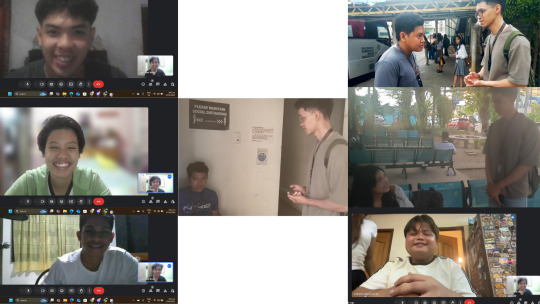
0 notes
Text
Week 6: The future of Campus Guide AI
As we shape the future of CampusGuide AI, student insights remain our guiding light. This week, we engaged with USTP students to envision how the platform could evolve beyond its current capabilities to truly transform the student experience.
Franz challenged us to think beyond reactive responses. "Current AI tools simply answer questions," he noted, "but imagine a system that anticipates needs tracking deadlines, sending payment reminders, and personalizing suggestions." This proactive approach could redefine how students interact with university systems.
Ivi stressed the critical need for system integration. "The real breakthrough would come from linking directly to enrollment portals, course dashboards, and official channels," she explained. Such connectivity would eliminate the exhausting back and forth between multiple platforms, creating a single, reliable information nexus that could even sync with academic calendars and learning resources.
Albert pushed the vision further into student development. "Why limit it to information delivery?" he proposed. The platform could facilitate mentor connections, recommend study partners based on coursework, or suggest extracurriculars aligned with individual interests effectively becoming a holistic student success companion.
These conversations reveal an ambitious roadmap for CampusGuide AI one that transcends its original purpose. Students envision not just a question answering tool, but an intelligent partner in navigating both academic and campus life. As development progresses, we're committed to incorporating these forward looking ideas, ensuring the platform remains indispensable throughout students' university journeys.
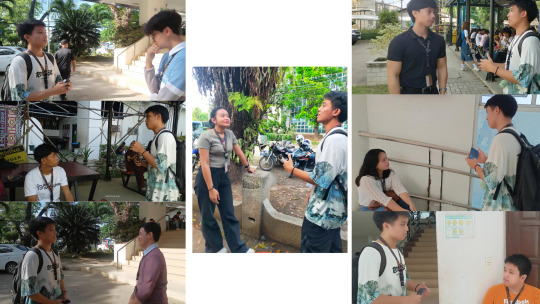
0 notes
Text
Week 5: How we can assist students on their troubles
Small frustrations often snowball into major obstacles for students. Renier described how routine tasks requesting transcripts or understanding enrollment procedures frequently become needlessly complicated due to unclear guidelines. What should be simple processes instead become sources of confusion and wasted time.
Yashavil highlighted the systemic problem of inconsistent information channels. "Critical details get scattered across Facebook groups, physical bulletin boards, and an outdated portal that rarely matches either," she explained. This fragmentation forces students to play detective just to assemble basic facts about their academic journey.
The consequences extend beyond inconvenience they create real stress. Keanu recounted spending entire afternoons chasing down answers to simple questions about campus services or program requirements. "We shouldn't have to work this hard just to understand basic university functions," he noted. This constant uncertainty doesn't just drain time it erodes students' mental bandwidth and academic focus.
Michaella Cedullo pointed out how these challenges disproportionately affect freshmen. "Upperclassmen develop workarounds, but new students face a steep learning curve with no compass," she said. Without proper orientation tools, first years often flounder, compounding the natural stress of transitioning to university life.
Imagine replacing this chaos with instant, reliable answers. CampusGuide AI proposes exactly that a smart, centralized system delivering real-time guidance on everything from enrollment checklists to scholarship deadlines. By cutting through the noise, an AI assistant could transform how students navigate academic life.
These student stories reveal a deeper truth: The core issue isn't information scarcity, but accessibility. Through conversations with Renier, Yashavil, Keanu and Michaella, we've designed CampusGuide AI to bridge this gap freeing students from administrative headaches so they can devote their energy where it belongs: learning and growth.

0 notes
Text
Week 4: Exploring Potential Validity
This week, we focused on validating our solution through candid conversations with students, uncovering the true pain points they experience when seeking university information. Their honest feedback provided crucial insights into the gaps in current systems and the urgent need for improvement.
A recurring theme emerged from these discussions: students face persistent difficulties accessing accurate, up to date details about admissions, deadlines, and academic policies. Many described wasting hours cross-checking conflicting information across various platforms, only to end up more confused than before. The emotional toll of this inefficiency was clear stress and frustration were common sentiments.
Jenica and Jeed, third year IT students, criticized the university's fragmented digital infrastructure. While online portals exist, they often prove cumbersome and unintuitive, creating unnecessary barriers especially for freshmen still learning the system. Both agreed that a streamlined, centralized platform could dramatically ease this transition. Keanu added that live updates would be invaluable during critical periods like enrollment, when outdated information causes unnecessary complications.
Celjie, also an IT student, analyzed CampusGuide AI from a technical perspective. He acknowledged its potential but stressed the importance of seamless integration with existing university systems. Close collaboration with IT departments, he noted, would be key to ensuring functionality and long term sustainability. While optimistic about AI's ability to deliver real time answers, he cautioned that consistent maintenance would be essential to keep information accurate and reliable.
Darel shared personal experiences with contradictory guidance from university staff and confusing online resources. Scholarship requirements, for example, often varied depending on who he asked, while official FAQs were buried under layers of technical language. These inconsistencies, he explained, frequently led to missed deadlines and opportunities problems a unified AI assistant could potentially solve.
These interviews confirmed two critical points: the problem is widespread, and our solution aligns with student needs. The enthusiasm for an always available, trustworthy information hub was unanimous. Students were particularly drawn to the idea of replacing guesswork with instant, verified answers.
This week's findings have been instrumental in shaping our next steps. Direct student input hasn't just validated CampusGuide AI's relevance it's highlighted exactly where the system must excel to make a real difference. With this clarity, we're more confident than ever in pursuing development.

0 notes
Text
Week 3: Defining the Core Problem and Pain points
Navigating university life should be exciting, but for many first-year students, confusion quickly overshadows that initial enthusiasm. Faced with a flood of questions about admissions, class schedules, and financial aid, newcomers often find themselves lost in a maze of unclear information and slow response times. Understanding these challenges is the first step toward creating meaningful solutions that truly support students.
Every student we spoke with expressed frustration with the enrollment process. Technical glitches that crash registration portals, last-minute timetable changes, and inconsistent communication between departments turn what should be a simple procedure into a source of unnecessary stress. Students like Datan described battling outdated digital systems that fail during critical moments, whether during enrollment or when checking grades. Meanwhile, Bryan, a junior, pointed out how overwhelming coursework and vague instructions contribute to academic pressure, leaving many students feeling unprepared. His suggestion? More organized peer study sessions and easier access to professors for guidance.
One problem stood out in every conversation: the absence of a single, dependable resource for campus information. Right now, students must scour websites, social media groups, and department notices often finding conflicting details just to get basic answers. This not only wastes time but also leads to mistakes and added anxiety during an already demanding transition.
Our solution is straightforward: a unified, intelligent hub that cuts through the noise. CampusGuide AI will serve as a always-available, accurate source for everything from deadline reminders to policy updates. By streamlining access to essential information, we aim to give students particularly those new to campus the clarity and confidence they need to focus on learning, not logistics.

0 notes
Text
Week 2: Identifying the Problem Space
The concept for CampusGuide AI was inspired by direct feedback from USTP students. Through in depth interviews with potential users, a persistent problem emerged: accessing university information is unnecessarily difficult and time-consuming.
Students consistently reported challenges in finding accurate, up to date answers to university related questions. Many described being forced to rely on unofficial sources due to long response times from overwhelmed helpdesk services a practice that often results in misinformation.
These experiences mirror widespread complaints in student forums like MAIN TRESBLAZERS and USTP Freedom Wall. Common questions about admissions, course requirements, deadlines, and policies frequently lead to confusion and delays. This overwhelming feedback demonstrated the urgent need for CampusGuide AI a solution providing instant, reliable, university-approved information around the clock.
These insights define our mission: to bridge information gaps, reduce wait times, and enhance the student experience through AI powered support. We remain committed to continuously improving CampusGuide AI based on ongoing user feedback to best serve our university community.
During interviews, students detailed their struggles to quickly access accurate information. Their stories revealed a systemic problem: without immediate, verified answers, students inevitably turn to unreliable sources. This input highlighted the critical demand for a centralized platform like CampusGuide AI to deliver timely, trustworthy guidance.
A key recurring issue is information inconsistency. New students in particular receive conflicting answers depending on who they ask, exacerbating confusion. Compounding this problem, limited office hours often leave urgent questions unresolved until the next business day, significantly disrupting students' academic planning.

0 notes
Text
Week 1: Why students need a smarter solution
For this week the team decided to aim for the following:
Address the Problem Space
Identify User Pain Points
Validate the Concept of the Solution
Find out of customers are willing to adopt to a new application within their technologies
Refine the concept if challenges were present
During this time, the team would like to address that specific problem of how the students are being inconvenienced throughout the navigating of information within their respective universities. However, the team would also like to address a communal point where students would have the same problems that are being addressed, this is crucial to narrowing down the problem space on which we can identify a specific problem that adheres to our application that being built.
This week, we spoke with several USTP students about the challenges they face when searching for university related information. Their stories revealed a clear pain point: the current system is inefficient, unreliable, and in desperate need of modernization.
Renz, a freshman, described the frustration of juggling multiple platforms just to find basic answers. “Between Facebook pages, group chats, and official portals, information is everywhere but never where you need it,” he said. The lack of a centralized source leads to confusion and wasted time.
For Lanz, the bigger issue is the lack of timely responses from offices. “Getting clarification on fees, deadlines, or submissions can take days if you even get a reply,” he shared. These delays create unnecessary stress, especially when deadlines loom.
Stephen, a third-year student, admitted that he often relies on classmates for information but even that isn’t foolproof. “We’re all just guessing sometimes. If my peers aren’t sure, I’m left scrambling,” he explained. This dependence on unofficial channels highlights a gap in reliable communication.
Lanz, who serves as a class rep, also noted how misinformation spreads in group chats. “Even ‘insider’ updates can be outdated or wrong, especially for events,” he said. Without a trusted source, students are left second-guessing details that impact their academic lives.
All students agreed that an AI powered chatbot could revolutionize how they access information if it’s fast, accurate, and tailored to their needs.
Stephen envisioned a tool that learns from user behavior: “If it remembers my frequent questions like enrollment steps or exam schedules it would save me so much time.” Others emphasized the need for real-time updates, eliminating the guesswork from university announcements.
These interviews underscore the urgent need for CampusGuide AI a centralized, intelligent assistant that delivers instant, verified answers. Instead of digging through disjointed sources or relying on hearsay, students could get reliable information with a single query.
From deadlines to campus maps, an AI chatbot wouldn’t just save time; it would restore confidence in the information students receive. By cutting through the noise, universities can empower students to focus on what really matters: their education.
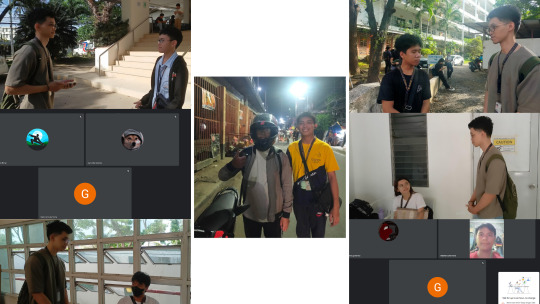
0 notes
Text
Self assessment
This week I took the MBTI personality test and the Berkeley index test, in order to assess my personal attributes. I took multiple personality tests before, however this is the first time I took the Berkeley index test.



For the MBTI test, I gained the same results from a few years back during my senior high school days, since we were also required to do this. It's kind of concerning how my results came out for me to be more turbulent rather than being calm and collected. The attributes being described in the photos provided above seems accurate to the way how I usually work, and still I find it amazing how other people can be of great influence to develop this kind of personality.


As for the Berkeley test it is my first time assessing myself in this platform, it seems like its an assessment for innovation sparking in an individual. As for the results there is definitely room for improvement, I do not seem to excel well on entrepreneurship however this is a fascinating skill to learn in order to back up my career in the future.
0 notes